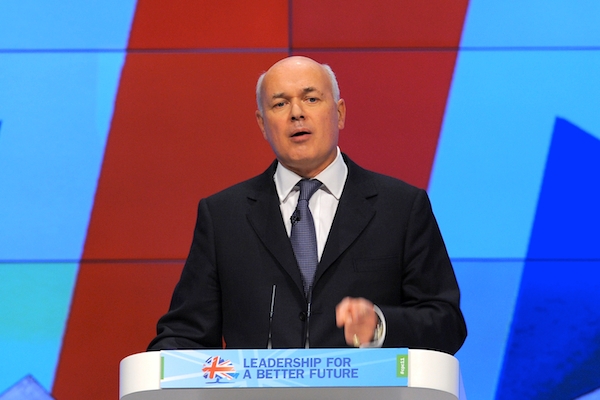‘You attack poverty by knowing what you do changes the lives of those people.’ In that phrase on this morning’s Today programme, Iain Duncan Smith summed up the difference between his approach to combating poverty and Gordon Brown’s. As Fraser has put it, Brown saw poverty as ‘a statistical game… his great spreadsheet puzzler’. The aim of the game? To reduce the number of people living in households below the ‘poverty line’ — set at 60 per cent of median income.
The easiest way to achieve this is to move people from just below the line to just above it by giving them a bit of extra cash (in the form of tax credits). Brown called this ‘lifting people out of poverty’. Indeed, sometimes you don’t even need to make them better off at all to get them over that line. Today’s new figures show the number of people below the poverty line fell by 500,000 from 2009-10 to 2010-11. But that’s mainly because the poverty line was lower in 2010-11 than it had been in 2009-10. The median income had fallen from £432 a week to £419 (the biggest drop since 1981), so 60 per cent of median income fell from £259 a week to £251. In 2009-10, a family on £255 was ‘poor’ but in 2010-11, a family on £255 wasn’t poor. They had, according to the rules of Brown’s game, been lifted out of poverty.
To IDS, that’s not really combating poverty at all. And here, his coalition partners agree with him — at least, their leader does. ‘Even those who ended up above the poverty line rarely saw real changes in their lives, or their children’s life chances,’ Nick Clegg wrote in 2010. ‘Poverty plus a pound is simply not an ambitious enough goal.’
And that’s the real motivation behind IDS’s attempt change the way we measure poverty. The Guardian says he wants to ‘downgrade’ the child poverty target, but what he actually wants to do is replace it with far more ambitious ones. In his speech today, he said:
‘The objective should be to show that life change is the key to moving people out of poverty, helping them to effect the change they need to rise above the dependency which has so reduced the quality of their lives.’
The government will no longer be able to simply move people over that 60 per cent line and claim that it’s ‘eradicating poverty’. Nor will it just ‘tell hard-pressed families simply to get a new job’, as Labour’s Liam Byrne claims. Tackling poverty will mean tackling its root causes, something IDS and Clegg set out in a joint article for the Telegraph a couple of months ago:
‘The pathways to deep poverty include worklessness, educational failure, debt, mental health problems and family breakdown. These are compounded by other factors such as addiction, poor housing and the criminal justice system.’
Duncan Smith’s point isn’t that we shouldn’t care how many children live in households with incomes below 60 per cent of median. We’ll continue to measure that, and continue to try to get the number down. His point is that that’s not all there is to poverty — and that it’s immensely damaging to pretend that it is.






Comments